#like. take artemis for example.
Text
I'm begging you batfandom to stop including that one RHATO page of Bruce hugging Jason in your "wholesome Batman loves his kids" compilations.
That hug takes place after Bruce laughs about the fact that he beat Jason into a coma for thinking he killed Penguin. It canonically takes Jason a month to recover from that fight. Bruce says that Jason deserved that "lesson", laughs it off and hugs him. I get that you want a specific characterization but that is NOT a good example if you read the comic.
#poteto ranting#and that's not even mentioning the fact that when jason fought him he had just lost his two friends#and then roy had to save him by knocking bruce out#i dislike roy as an outlaw but that's besides the point#it is still heavily implied by alfred that bruce is pissy because of selina leaving his ass and he's taking it on jawon#and and fun fact before that hug bruce had also carelessly announced that roy was fucking dead#that's right the person that saved jason from his raging father is dead#artemis and bizarro are gone#and jason is completely alone#so yeah i dont like seeing that storyline listed as an example of a loving father-son relationship
4 notes
·
View notes
Text
my opinion on love triangles in fiction is that the one whom the two others are in love with should always be a woman
#idc abt a man getting chased#a woman being at the center tho >>>>>>#bonus points if it’s three women#also when it’s a guy at the center of the triangle there are always some idiots saying shit like the girls should date each other <3#just to play mediator even tho the girls have nothing in common#it’s hilarious actually#amber x eve look away my last point isn’t abt you i love you <3#but still#let’s take yj for example#why a made-up by ch*lant shippers triangle w zee/dick/babs#when we could actually be a civilized society encouraging the muxh more angsty and juicy zee/artemis/wally
5 notes
·
View notes
Note
Was evelyn ever ALMOST caught by witch hunters?
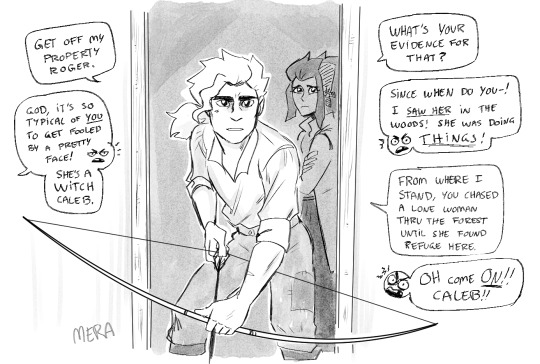
I WROTE IT, BECAUSE DRAWING IT TAKES TOO LONG.
For some reason, I forgot I could just...... Write these little shorts with little illustrations alongside it, instead of drawing out the whole thing and it takes forever. So... here ya go! Two more little drawings beneath the cut with some text!
Roger growled through the gap amongst his ivory. He could not wrap his head around why his rival was standing there with bow and arrow, willing to.. What? Shoot him? For this woman. Barely a Christian woman, even.
"What are you going to do?" Roger gestured at Caleb's homemade weaponry. "You're going to shoot me if I don't leave?"
"Maybe." Caleb said, still not tensing the bow. "My brother's a real clever guy, he knows a lot about the body. Did you know that arterial bleeding is the most fatal?"
"Uh-"
"Looks the most accidental, too."
Roger furrowed his brows.
Caleb's brown eyes were void of warmth.
"What are you saying?"
"I'm saying I'm holding a bow. I'm saying I'm pretty good at using it. I'm saying I'm a woodsman, you're not. I'm saying that if I wanted to accidentally shoot you and hide your body, I could. And if you were discovered, it's an arrow in you, not an English pistol wound, or a knife. And nobody knows you were ever here."
"...You're not serious."
"You can always find out."
"You're bluffing, I've never seen you use a bow and-"
"Leave my property." Caleb repeated. "And if you are going to accuse my friend of witchcraft, you better have more than suggestive or spectral evidence."
Roger glowered back, held his hands up in peace, and backed away. "Fine, I will." And left the way he came through the woods.
Caleb waited until he couldn't see him any more, before locking the door and pulling the curtains.
Roger had never liked Caleb, but before his rival took a break from witch hunting, Roger had at least had a competitors respect for the man. But respect turned to suspicion. Caleb had been acting strange for awhile... Glum and a lot more quiet. Then that woman showed up. And now the cove were against spectral evidences?
Caleb had been the most frequent and outspoken about how witches found a lawful loophole by using supernatural means to get away with their crimes. As it was difficult to prove that a witch had tormented someone in their dreams, for example.
And Roger agreed! Sure, Caleb was annoying, but they had both been amongst the best and the worst of hunters, being the same age only meant the two lads butted head to stay in their spot as head of a patrol. Being a witch hunter was a competitive sport, almost, it was hard to explain unless you participated.
They were not friends, but Roger was sure if the roles had been reversed, Caleb would've been suspicious too and, honestly? Caleb would've tried to save Roger. It was just good sportsmanship.
And this whole thing smelled wicked.
Caleb turned to Evelyn. "Are you alright?"
"I don't know.." She said and looked at her hands. Artemis had crawled out onto her shoulder to give her a comforting little spider hug. "My magic.. It didn't work."
"What?" Caleb abandoned his bow by its place next to the backdoor. "It's not working?"
"I don't- I was trying to make it work, he saw me. I'm sorry."
Caleb lift her chin up. "Hey no, it's alright. Maybe.. You've just been here too long?"
"No that's not it. I know it isn't."
"Maybe you're ill?"
She smiled up at the crease of worry on his forehead. He was trying to sound calm and proper, and she knew that tone of his. That rougher, almost demanding, serious tone. That tone he used with Philip and his friends when they were turning to him for leadership and give them orders - even if he was just as anxious as them.

His eyes flickered away, noticing that she had caught him spiralling with worries. He shook his head to get out of it and straightened his back.
"Are you ill?" He repeated with a softer tone
"No, I dont think so."
"Not witch-ill, human-ill?"
"No... I don't have any symptoms."
"Hm.." Caleb thought back at when she had visited him at his job. "Oh, was it the sprig of dill tea?"
Evelyn's eyes lit up. "Oh! Oh right that did taste awful!"
Caleb couldn't help but break out into a soft scoff. "Well, good to know that folktale is true."
"Huh?"
"It's said sprig of dill keeps witches and evil away. That's why we drink it at the morrow' meeting."
Evelyn's lips pressed into a line, feeling a little silly that she had so readily accepted tea from a bunch of woodsmen-slash-witch hunters. Of course they would be drinking things like that out of superstition.

"Right." She brushed her vest.
Caleb snorted.
"Stop it! I was afraid!"
"Sorry, sorry. I'm sure it's only temporary."
Evelyn looked at her hands. "You think so?"
"Yeah. But.. Why don't you stay here, just in case, until it comes back. Yeah?"
"Appreciated."
"Of course."
Evelyn swayed her skirt bashfully. "Caleb?"
"Mh?"
"Thank you." She pulled him in so she could plant a kiss on his cheek. "You've been my hero today."
Caleb's limbs were full of pink and red butterflies. He laughed nervously and swatted his hand around in the air.
"Oh! PFSH! O-Of course! I can't just- You're a maiden in distress! It's only the right thing-! Anytime, milady." And theatrically rolled his hand before bowing to her.
And that got him in the right height for both of her hands to cup his face.
"I think you deserve one more then."
And kissed him on the side of his nose, his forehead, and when his smile spread his lips wide across his face, she kissed the dimple by his side. And that was enough. Caleb crumbled, and turned away from her with an incoherent sputtering of words.
She smiled.
Caleb put his face in his hands to cool, stroked them through his hair and coughed. "TEA?" He offered, gesturing at the stove. "Er- not, that tea, better tea."
"Sure."
And took a seat nearby him.
#toh#the owl house#ttocw#the tales of caleb wittebane#toh caleb#toh evelyn#witteclaw#wittewife#caleb x evelyn#caleb wittebane#eveyn clawthorne#ttocw drabble#ttocw short#ttocw text#ttocw art reply#cavelyn#evelyn x caleb#wittethorne
636 notes
·
View notes
Text
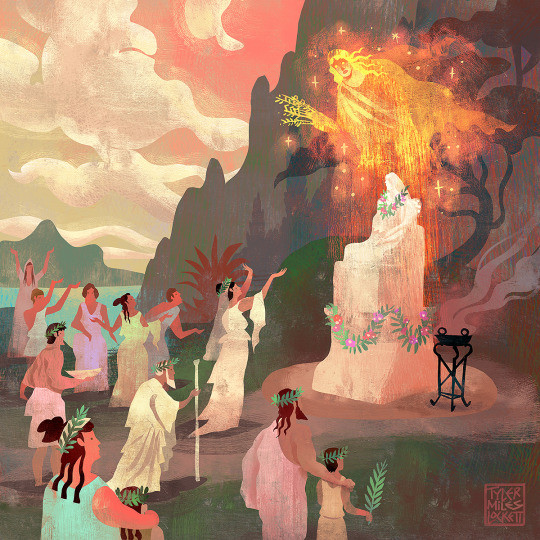
Hellenic Polytheism or Hellenismos is the traditional, polytheistic (multiple gods) religious belief system of Ancient Greece. Modern people who believe in pre-Christian and polytheistic belief systems often refer to themselves as pagans. Let’s look at some of the general practices of typical Hellenic worship.
Hellenic Polytheists use altars or shrines to worship specific Gods within the Greek Pantheon. For example, an altar for Apollo may contain an image or sculpture bust of the god, as well as a side table, called a trapezōmata, which holds offerings of incense and flowers or food and drink such as wine, honey, milk, or olive oil. Another tripod incense holder was called a Thymiateria.
Before engaging in a ceremony, the practitioner will employ purification methods with lustral water (ritually cleansed). They may recite hymns or prayers in honor of the god, using the Homeric hymns for example. The practitioner may use a divination practice to seek guidance or gain insight from a god through methods like casting lots, reading signs from nature, oracle prophecies, and dream interpretations. In their ceremonies, ancient Greeks would perform rites in respect to their Ta Patria, (ancestral homeland heritage), and they would take pride in their reverence with Hos Kallista, or the highest level of beauty.
Hellenic Polytheism follows annual calendar festivals commemorating Gods or famous mythological events such as the Panathenaia in Athens (commemorating Athena), the Anthesteria and City Dionysia; (festivals celebrating Dionysus) The Olympics (a physical competition in honor of Zeus) and the Thargelia, (dedicated to Apollo and Artemis), and the Thesmophoria, (a festival exclusive to women in honor of Demeter), among many others.
Want to own my Illustrated Greek myth book jam packed with over 130 illustrations like this? Support my kickstarter for my book "lockett Illustrated: Greek Gods and Heroes" coming in October.You can also sign up for my free email newsletter. please check my LINKTREE:
#pagan#hellenism#greek mythology#tagamemnon#mythology tag#percyjackson#dark academia#greek#greekmyths#classical literature#percy jackon and the olympians#pjo#homer#iliad#classics#mythologyart#art#artists on tumblr#odyssey#literature#ancientworld#ancienthistory#ancient civilizations#ancientgreece#olympians#greekgods#zeus#hesiod
524 notes
·
View notes
Text
aphrodite (1388) persona chart observations (part 1)
welcome to my mini valentine's series on the goddess of love and beauty - this month 4 observations will be released regarding the aphrodite persona chart! all observations are in reference solely to aphrodite persona charts. these observations are completely hypothetical. they are based on my (the those closest to me's) experiences with each aspect/ placement! please don't take everything i say as predestined, astrology is possible outcomes not guaranteed ones. this is just a starting place for when examining singular objects in an entire galaxy (these are not the only asteroids in affect for you). take what resonates and leave what doesn't!
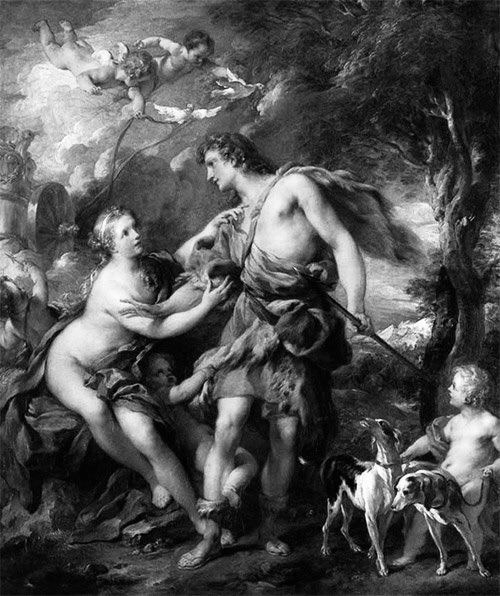
♀ sun-vertex people will find they are adored by a great many people in life
♀ virgo (6°, 18°) moon, 6h moon, and/or moon negatively aspecting mercury or mars often have issues with their sexual organs - ex: endometriosis, fibroids, PCOS, etc
♀ water and earth moons are likely to have large breasts; they also tend to be the most "womanly shaped" and thus "breedable"
♀ moon-venus aspects are often very fashionable people
♀ moon-uranus people are ultra feminists - for example: they are the ones who don't tend to accentuate their femininity in terms of fashion, who don't care about about body appearance for others, and/or tend to advocate that all women are beautiful BUT are more than their looks
♀ moon positively aspecting uranus tend to receive a lot of praise from those around them about their looks despite feeling they are unattractive - while the negative aspects tend to adopt a lot of routines to glow up or maintain beauty yet recieve little to no praise
♀ moon-hephaistos (2212) people may be outcasted by other feminines OR constantly rejected by them
♀ moon negatively aspecting hestia (46) people could feel like they aren't womanly enough because they aren't home-maker type of people, and/or they might feel shame do to a lack of "virtue" at some point in time
♀ you'll definitely want romantic advice from those who are an air mercury, air venus, and/or a venus ruled mercury; these people are extremely eloquent when it comes to love and emotions
♀ having a water mercury can indicate very deep emotional intelligence
♀ water mercuries have a love language of physical touch and/or quality time, air mercuries have a quality time and/or words of affirmation love language, fire mercuries have acts of service and/or physical touch, and earth mercuries have gifts and/or physical touch... am i right? click here to take the test - tell me your aphrodite mercury and you top result!
♀ mercury or venus ruled 3h people tend to be extremely poetic
♀ mercury-venus people really like the attention they get from drama and gossip
♀ mercury-jupiter positive aspects are often giving to and receiving compliments from others - while negative aspects tend to receive very few and tend to keep their thoughts on other people's looks to themselves
♀ mercury-jupiter positive aspects may have an easier time of sharing their feelings and those feelings being while received - while negative aspects may find that they have a hard time saying how they feel or feel as though when they speak about their emotions that their sharing was in vain and thus not received by the other party at all
♀ mercury-uranus people are manipulative on small scale (white lies, intimate inner-relation lies (most serial killers have tight orbs between these planets in this persona chart), influencing (kim k has a conjunction), etc)
♀ if you want someone who knows how to dirty talk, find a mercury-pluto person; they are very much a eloquent poet in the daylight and devious dirty talker in the night. these people also tend to read a lot of smut or they could write it!
♀ mercury and/or saturn aspects to artemis (105) are the best at adapting to shifts in romantic life or to a partner's lifestyle
♀ mercury-eos (221) people are very poetic when asked about their experience with love
♀ a lot of fire venus people have femme fatale fashion aesthetic and beauty standard - while air venus people tend to dress like soft, girly aesthetic
♀ people with venus ruled by venus or mars OR aspecting mars tend to be seen as very desirable in the societal sense
♀ venus-mars aspect people have a lot of masculine suitors they get adoration from and/or that they dote on
♀ venus-uranus people, like moon-uranus, people are very likely to be feminists - venus-uranus people tend to advocate for LGBTQIA communities extremely inclusive to the trans-community (venus is the genitalia)
♀ venus negatively aspecting neptune people always have a crazy story to tell about their love life and ex lovers

like what you read? leave a tip and state what post it is for! please use my "suggest a post topic" button if you want to see a specific post or mythical asteroid next!
click here for the masterlist
click here for more greek myths & legends
want a personal reading? click here to check out my reading options and prices!
© a-d-nox 2024 all rights reserved
#astrology#astro community#astro placements#astro chart#asteroid astrology#asteroid#natal chart#persona chart#greek mythology#astrology tumblr#astroblr#astrology readings#astro observations#astro notes#aphrodite persona chart#aphrodite#asteroid1388#hephaestus#hephaistos#asteroid2212#hestia#asteroid46#artemis#asteroid105#eos#asteroid221
294 notes
·
View notes
Text
Was your favorite book turned into an absolutely god awful movie?
If so, you may be entitled to emotional compensation! In this tournament, the worst adaptions will duke it out to determine which is, actually, The Absolute Worst.
Qualifications:
Must be an adaptation of a book. If I allowed things like comic books, the entire mcu would be submitted
It doesn't actually have to be a bad movie-- take How To Train Your Dragon, for example. It's a great movie! I love it! I would even say that it's my favorite movie! It's not a good adaption, though. Very different from the books (or at least, the two that I read)
It doesn't have to be a movie-- if a book got adapted into a really shitty show, then that would be allowed in
Rules:
Be civil. It is a silly tumblr tournament. If you absolutely must, then beat down the adaption of your fave, rather than beating down the original, or you know, REAL ACTUAL PEOPLE.
Propaganda is allowed and encouraged, both during the voting and submission periods
Honestly there's nothing I can think of to ban so I'm just going to leave you here with another message: I know where the block button is.
Automatic entries:
Percy Jackson
Eragon
Artemis Fowl
Submissions closed!
@bestanimatedmovie @badass-queer-couples-battle @gayest-non-canon-showdown @cringefaillosersummit @undatablebracket @underrated-adversaries
636 notes
·
View notes
Note
Whats your opinion on the design of morpheus and rachel's representation of a trans character?
I think her design is a lot better now than when it was first introduced, though I'm not really falling on either side of the arguments regarding her design and whether or not it's poor representation because I can see and agree with arguments from either side.
I think representation of all body types in the spectrum of gender identity is important and so it's not necessarily "wrong" for her to have the body type or design she has. Again, her design was a little rough in the beginning, but it's gotten a lot better and I have a lot more appreciation for it now.
That said, I also understand and agree with the criticism of Rachel's intentions in writing Morpheus as a trans character, because she is yet another example of Rachel taking a character who wasn't strongly affiliated with queer rep and randomly turning them into queer rep while erasing the LGBTQ+ qualities of characters who are commonly expected to be so, like Eros, Artemis, Apollo, etc. It feels a little tone deaf and makes it feel more forced rather than genuine.
And while I'm not at all against the concept of transfem Morpheus on its own (they're the god of dreams so there's a lot you can have fun with there!), it's just hard to have good faith in her being written as a "trans representation" character when Rachel literally removed and replaced all of Aphrodite's LGBTQ+ children (including Hermaphroditus, who was literally intersex) and has fridged just about every queer character in LO up until this point. Even Morpheus herself has been fridged recently with the whole "getting kidnapped/possessed by Kronos" plotline. At the end of the day every LGBTQ+ character in the story is forcefully rewritten into gods who weren't traditionally LGBTQ+ , while removing / erasing the ones who were, and all of them are still having to make room for the main toxic heterocis couple who are literally the most boring part of their own story (ノ_<。)
#ask me anything#ama#anon ama#anon ask me anything#lo critical#anti lore olympus#lore olympus critical
140 notes
·
View notes
Text
DCxDP Prompt: Vast Supernatural Au
What If, The Infinite Realms Was More Then Ectoplasm? What If The Fenton's Only Acknowledged Ectoplasm And Obsessively Denied The Existence Of All The Other Types Of Energy And Material In The 'Ghost Zone'? What If Danny Wasn't Just Exposed To Ectoplasm, But Mana, Yoki, Spiritual Energy, Etc. What If He Started Cycling Out The Ectoplasm, And The Other Energys Became More Dominant? What If.... Danny Became A Deity?
Basically this is just a Au where the Ghost zone, is really the Infinite Realms, which encompasses multiple dimensions, Cosmic Forces, and Energys. So Danny got Flooded with and Fused with Mana, Developing a Magical Core, Yoki, effectively becoming a Yokai, Spiritual energy, becoming effectively a Nature Spirit. Due to his actions and being a hero, people start looking up to him, much praise and gratitude is shown to him. Due to this, the Yoki and Mana in his body effectively pick it up and steadily start shifting him from a simple Yokai, to a Kami.
But of course, he lacks a Shrine, and therego, cant fully transition, which is a Irritating process..
The few Gods and Kami that sense Danny's developing Divinity and actually care that its happening. (Look, there are always new gods and deitys forming, both from the living who have passed away, and from the imaginations of the living and dead. The Shinto, Norse, and Greeks are prime examples due to having them be made up of populations of God's and goddesses, who have children with each other. The few that Due, come to see the situation, on why a Kami was developing in America, and find a human with Ectoplasm, Yoki, Mana, and Spiritual energy saturating his body, practically a Partially dead Hanyo whos possessed his own dead body. The Ectoplasm is deteriorating and the Yoki is becoming more dominant. He lacks a Shrine. There are a pair of human Scientists who are clearly his parents who seem to obsessively believe that not only is he a ghost, but that ghosts are emotionless and evil, yet dont seem to acknowledge that the one they are shooting at is their son. Kami from Japan reach out to Princess Diana to help with the situation, something Athena and Artemis also want.
Clockwork is Kronos, but he's left his mortal flesh. He tells Danny of what he truly is and what he's becoming, revealing that Ghosts are barely a 10th of what exists in the infinite realms. He tells Danny how he needs a Shrine to properly ascend to Kamihood, but also that he needn't worry about losing his Humanity when he does. Danny himself can't make the Shrine, but Sam and Tucker can!
His appearance as a 'ghost' has changed, his Hazmat suit has shifted to a somewhat Shinto outfit thats a mix with his previous Hazmat suit, and a deterorated Hagoromo on his shoulders, showing he's reaching the rank of Kami. People see his changes and do research, and learn of Shinto and Buddhism practices, and Spiritualism in general. This leads to a good few in the community of Amity to making Phantom a small Shinto style Shrine. Cujo, who isn't a ghost dog, but is a Inugami here, ends up taking Residence at the Shrine, which steadily makes him change into a Komainu. Also, multiple Cats start showing up and living at the Shrine, something Danny actually likes alot, to the point that he, as Phantom, starts building some cat houses around his Shrine.
Over time, as Jack and Maddie start struggling to figure out what Phantom is now, as before he showed up on their ghost equipment, but now he doesn't. Jack starts seeing the bigger picture, looking and analyzing the different energys in the Infinite Realms that he previously refused to believe were there. He realized, why were they trying to apply the rules of their dimension on a dimension clearly completely different from theirs? Why were they refusing to apply the theory that the interaction of two or more different realitys would require a completely foreign set of laws to try and analyze it all. Why were they trying to apply the laws of Physics to explain magic? And like that, his obsession was resolved, he didn't have the insane impulse to blame ghosts for odd things or to shoot at anything abnormal the second he saw it, suddenly, his issues were resolved in an instant. The ectoplasm, they were so contaminated in it that their obsessions had bound to it and formed into a core that made them impulsively driven by them. And with his Obsession resolved, the ectoplasm had dissolved. Jack could now clearly see the near identical appearance between Danny and Phantom, there voices and Mannerisms, the similar time frame from the incident with the Portal with Danny and the appearance of Phantom.
Danny has also been developing Cat-like traits from his act of building cat homes around his Shrine, effectively making the cats worship him.
The ghosts that originally appeared have slowly begun to stop, the few that still do being those that lived in Amity before they died.
Danny has a number of Divine Affinity due to how he formed. He is a Kami of Cats, Protection, kindness, winter, safety, and Star gazing.
When he properly becomes a Kami, its a rather public event, some ancient ghost attacks, sensing a Kami forming in America. The Fentons are scanning through out the fight, Jack actually switches on the scanners for the other typs of energy, which angers Maddie because she is still in Aggressive denial about them. Phantoms Ectoplasm Readings are fluctuating, as if trying to keep itself active as its being burned away. While Two of the other reading show spikes and growing while the Ancient talks down to him as it pummels him, things like 'YOU THINK YOU CAN PROTECT THEM?!' 'I'LL BE SURE TO MAKE THEM SUFFER AS WELL FOR MAKING YOU FORM!'. While everyone is watching helplessly, they pray and hope for him to win, to protect them. Suddenly, everything stops, and Phantom, Screams! In a burst of power, all Ectoplasm readings die on Phantom, while one of the others, rises and stabilizes, becoming the dominant energy. Hovering in a Crater, stands Phantom, now dressed in Traditional male Kimono, a Hagoromo proudly floating on his shoulders, at his feet, a pair of red painted wooden wheels with what appear to be clouds flowing from the axel holes. In his left hand, a Glave. His hair a foot longer, snowflakes gently appearing and falling around him.
He then pummels the ancient, and destroys it with ease. Maddie is having a panic attacks and is struggling to understand the situation. Phantom is standing there looking over himself, trying to understand himself what just happened. Maddie sees a chance, she grabs the Fenton Fermos, runs up on Phantom, opens it, activates it, and- doesn't suck up Phantom, only the remaining ectoplasm from the Ancient. It doesn't work of Phantom, he doesn't have ectoplasm anymore, hes not, in anyway, a ghost anymore.
@stealingyourbones @im-totally-not-an-alien-2
#danny phantom#dp x dc#danny fenton#dc x dp#wonder woman#dp x dc prompt#dcxdp#dpxdc prompts#Kami!danny au#sean's fanfiction idea prompts
453 notes
·
View notes
Text
(I promise I reach a conclusion at the end bear with me)
Something I've really noticed is that whenever people are around, Apollo gets really queasy when it comes to the human body. An example is The Grey Sisters' eyeball, he immediately got squeamish and screamed about how gross that was. He becomes an awful doctor/healer, randomly prescribing aspirin to everything.
But the moment there isn't someone around or a healer in sight he immediately becomes the best doctor in the world??? He got grossed out by an eyeball but as soon as he saw Lu's cut-off and mutilated arms, he didn't flinch and healed her almost fully with a tiny speck of godly power and a first aid kit.
Same thing with Frank he panicked and went straight to business as he realized that action needed to be taken immediately and cutting off his reunion with Artemis.
And I say he does this on purpose to encourage maybe his children to take action in situations he knows they can and he won't show off vital skills just like that. Apollo lets people do it because they need to learn this in order to survive, and my guess is he's been doing this for millennia to let humans and demigods alike to grow more proficient and confident in their skills so that they do not need him.
When Artemis said Apollo wasn't as good as Asclepius in healing because he didn't really practice and didn't care and that it would take too much time, she was wrong. He probably worked on his healing ability for centuries and just wouldn't show it. When Frank fainted, immediately his reflexes kicked in to save him which is an obvious sign.
Not only that, he said so himself that he had collected the spit of so many animals to check their healing properties in the first book, and unfortunately did not do lions. That just shows commitment.
What am I trying to prove here? Not a clue, just that everyone's wrong about him and he's an actual healer god, one of the best there is, but just doesn't show it to encourage others to become doctors and save people, which is literally the best thing they can do in life. Apollo is gifting them a once-in-a-lifetime opportunity to do so much good.
The main point of ToA is healing and recovery. Mostly from Zeus' abuse in this case and how he tried to save everyone unlike the god of destruction everyone thinks he is.
My belief is that Apollo's main domain is healing and all his other ones are kinda a part of that. Music no need to go into, the sun is rejuvenating and represents a fresh start, prophecies are all about knowledge, which can also be healing, plague is needed to balance it out and is needed sometimes for recovery, and archery connects with the plague which shows death is needed for life and is in fact vital.
Apollo is the god of healing.
#lester papadopoulos#trials of apollo#toa apollo#toa#apollo#pjo apollo#healer apollo#make this a thing guys#wow i can't believe i reached a suitable end#what a weird rant#HEALER APOLLO!!!!
241 notes
·
View notes
Text
Apollo & Dionysus [Part 1]
MAN. not sure if i know what i'm doing, they're very complicated and this won't be my only essay about them. But I've been delaying this essay for way too long, to a point in which I was close to crying about it.
Hope you enjoy, in any case, how i give you all the connections, both good and bad, of my favourite god figures from the Greek Folklore.
1. Karneia [Καρνεῖα].
One of Dionysus' main characteristics is how he's depicted with horns. It's part of his identity as a god, it's horns what (according to the Orphic hymns) made him look like Persephone's son. you can't take away his horns and pretend he's still Dionysus. Euripides knew that well.
Apollo, on the other hand, not many are aware that he sometimes was represented with horns, as well ! This festival, held mainly in Sparta, was to honor Apollo (and a couple of other gods but, he was the star of the show).
The reasons for why this festival was held vary; like Pausanias saying it was to calm him down so he wouldn't send a plague.
But, you see, the main reason this festival is mentioned here: the Spartans would stop any military activity to honor a horned Apollo, he resembled Dionysus during that time. And not only that, but he also was related with vines during it, and that's Dionysus sacred plant. Just like the laurel (or bay, i think it's called in English) is the sacred tree of Apollo.
Seeing Apollo with that plant, and harvesting grapes while having horns, has a strong conection to what Dionysus is.
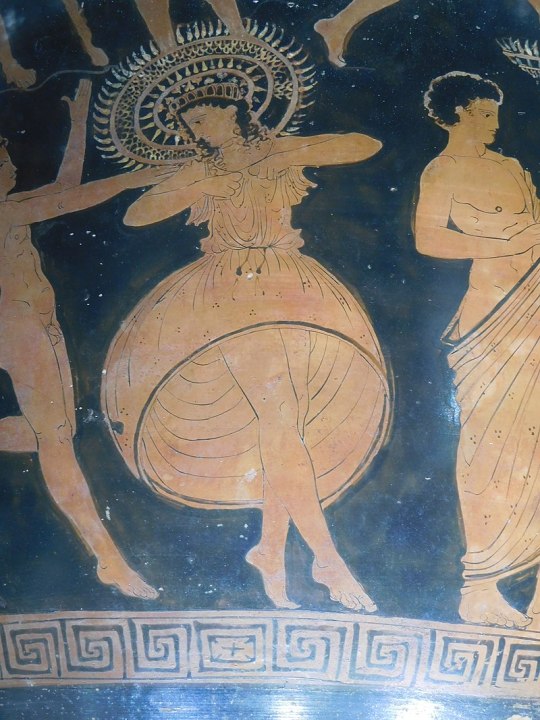
2. Delphi's Oracle.
It's still Apollo's Oracle, wether Dionysus kept it while he was gone at Hyperborea or not. He killed Python, Gaia's big-ass snake, in order to get it.
But.
While Apollo had to leave during the winter time to go to Hyperborea, it was Dionysus OF ALL GODS the one who kept Delphi, and thus, his festivals were celebrated there.
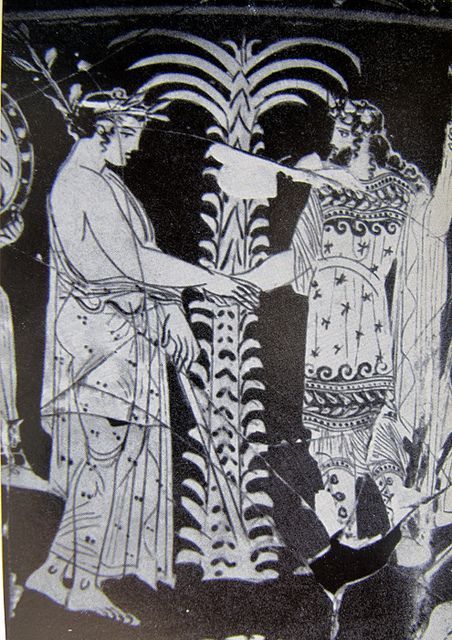
On one side of the main temple, you could see Apollo with his twin sister, Artemis, and his mother, Leto.
And on the other side, it was Dionysus.
Dionysus wasn't related to prophecies, at all. Maenads did shenanigans during the time Apollo wasn't there.
But it's, you know... Interesting, that Apollo's most important oracle was kept by Dionysus during the time that he wasn't there.
With this, you should think "then, they're in good terms, right?" Yeah, well, they're supposed to be, there's nothing stating that they have a bad relationship, it's the other way around, actually !
But the next point... Is gonna leave us all confused.
3. Orpheus.
Or, as i like to call it:
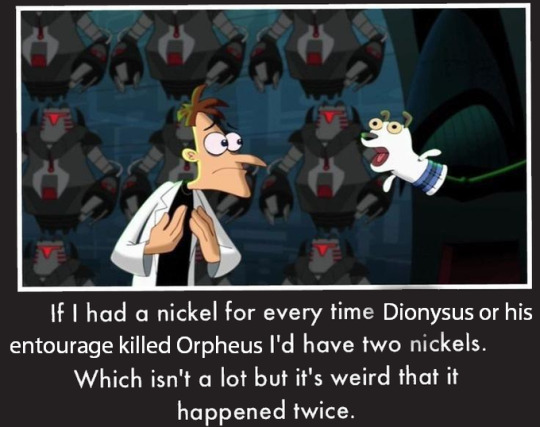
And my favourite part of this essay, gotta say !
Orpheus brought many cults to the Greeks, according to Pausanias. Like the Eleusinian Demeter one, for example. And not to forget, Orphism gets his name from him, as well as the Orphic Hymns, obviously.
But, apparently, besides doing all that, at the end of his life, he claimed to not care about any gods, not even Dionysus, the main figure of Orphism, that weren't Apollo.
And his death was explained in a lost play of Aeschylus, one that two different writers describe; Eratosthenes and Pausanias, so pick your favourite:
P: 1. the maeneads saw Orpheus refusing to worship Dionysus, and killed him.
E: 2. Or, the interesting one: Dionysus saw that Orpheus devoted himself to Apollo and Apollo only, and got... Jealous. Jealous of his devotion to Apollo.
He was the one who started Orphism, the one who wrote many hymns for him. Seeing him being devoted to someone else than him apparently wasn't a good move. In this version he sent the maeneads to kill him, they didn't go for their own will, which makes it more peculiar.
I'm not writting down Ovid's version because it doesn't fucking count.
Plato also says some odd thingy, that "the gods imposed on Orpheus the punishment of dying at the hands of women for not having had the courage to die for love like Alcestis, daughter of Pelias, who had died in the place of her husband Admetus." ... Which, yeah, sure, I guess, whatever you say, buddy. We have to keep in mind Plato's texts are more related to philosophy than anything.
People always say it's Apollo the one who was envious of Dionysus' talents and parties, (for... some reason i guess) specially knowing how he had two of his muses related to him (tragedy and comedy) due to Dionysus being, after all, the god of theatre.
But, surprise ! It was the other way around. Dionysus was jealous of Orpheus' devotion to Apollo. "If you won't devote yourself to me, you won't devote yourself to anyone".
And, well, either because the sources didn't survive or because he wasn't considered his son in these versions, Apollo didn't do anything. In fact, we never see him doing anything towards Dionysus.
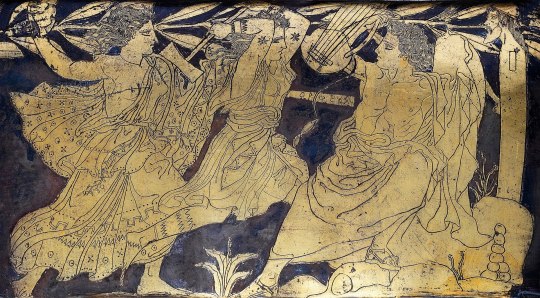
So, what now, Nysus? What was their relationship exactly, after all of this?
It's... Complicated !! Okay !!! This needs more research from my part, plus we all should keep in mind that, while all the authors mentioned here were Greek, they were different guys. You always need to keep in mind the place, person, era... All of that, before starting to judge how a dynamic between two gods work.
( If you enjoy my badly-written posts, please consider buying me a kofi ! You're not forced to, though, but please, reblog this post at least if you are gonna leave a like ! 💕 That's what will motivate me to keep working on my essays )
147 notes
·
View notes
Note
I have a question about Zeus and Kronos. SEVERAL actually. Their relationship gets more confusing the far you dig into it.
How did the ancient Greeks see their relationship? How did they see the whole conflict between the Gods and the Titans?
In modern works, Kronos and the Titans are almost always portrayed as evil, monstrous tyrants, and Zeus and the Olympians as the young heroes that bring them down.
However, in Greek Mythology, Kronos' reign was the Golden Age, an utopic and paradisiac time of peace, happiness and prosperity, and Zeus is the main responsible for bringing pain, disease, and death to humankind through Pandora.
And to make matters more confusing, patricide was a huge sin in ancient Greek culture.
Was Zeus and Kronos' story a heroic tale of order overcoming chaos, or a tragic "Paradise Lost" type of scenario? Is Zeus a hero for deposing his father, or fallen hero that only escaped divine retribution because he himself is a god? Who was in the right in the conflict between Olympians and Titans? How am I supposed to interpret Hesiod's Theogony?
This is a very complex question that opens the door to many, many possibilities. But long story short: in the Olympians vs Titans conflict, the Titans were definitively in the wrong, and yes we are supposed to root for the Olympians.
Remember, the Olympians are supposed to be the "big goods" of Greek mythology - or at least, mostly positive figures. The enemies of the Olympians are by extension our enemies because the Olympians represent order and civilization. The Gigantomachy is the best representation of that, as the Giants were literaly designed to kill and destroy and nothing else. Same thing with Typhon, chaos and terror embodied.
Now what was the problem with the Titans? Long story short, many things. But what we have to understand is that the Titans are being supposed to represent... yes chaos in a way, but also a more brutal, primitive form of the universe. Yes the Titans are gods like the Olympians - but they are not the same kind of gods. Older, rougher. For example take the Olympians - they are kings and queens over the principles they control. Poseidon rules over the sea but is not the sea ; Zeus' decisions control the weather but he is not the weather. When we go by the Titans, however, we have beings such as Helios who was the literal sun or Oceanos who was the literal ocean. The Titans reflect the primal forces of nature, the rough and brutal, less humanized elements, more personifications and embodiments than deities as we understand them today. So what was the object and purpose of the Titanomachy? The "taming" and ordering of the world. Some Titans sided with the Olympians, and thus became more human and more "ordered" and found a place for themselves within an organized world. Themis for example, who as the embodiment of the Law and of Justice, would of course choose the Olympians' side. Also note that, outside of Themis, none of the Titans reflected any concept or principle part of a civilization. The Titans were violence (Iapetos whose name means "piercer", and Kronos who castrated his own father), the Titans were animals (many are the titans with strong animal motifs), the Titans were the sea and the moon and the sun and the light and the earth... They were literaly born out of the sky and earth. But what came with the Olympians? When Zeus got onto the throne, he started creating new gods through his many marriages and alliances: he brought forth Apollo of the art, Athena of wisdom and peace, Artemis of the hunt of the wild, Hermes of all the sciences, and the Horai, and the Muses, and sometimes even the Moirai themselves. Zeus organized the world and brought many of the concepts we cherish so much today.
Not only was the problem with the Titans that they were primordial and brutal forces of nature, but the problem with the specific Titans that went at war against the gods is that they literaly refused to let fate be and time pass. Kronos' flaw and fault is the most common of all mythology: fighting an oracle, trying to destroy a prediction, trying to avoid his fate. He was foretold he would be overthrown by his son. Not destroyed, not mutilated, certainly not killed (because gods cannot die, they are immortal), but just overthrown. And he refused this. He refused to have his throne taken away from him - he refused to let generations change, to let youth come. He had obtained his throne for right reasons (he punished the sins of his father) and yet through bad means (mutilating his own father). As such he got the throne but was fated to let it go, and know a "lesser" version of what he had inflicted upon his father. But he refused this.
Not only that, but he actually ended up repeating the mistakes and crimes of his father Ouranos. By not just bringing a stasis, but by literaly causing a regression. Imprisoning back the Cyclops and Hekatoncheires he had set free ; and then swallowing back into his belly the children he brought forth, literaly reversing the natural cycle of time. So Zeus' war against Cronos was justified to allow the world to continue its own maturation, and evolve further. And from a world of brutality, barbary and regression, we reached an age of order and civilization.
Now let's take the second side of the problem - the whole "Ages of Mankind".
It should be recalled that the Ages of Mankind story comes from Hesiod's "Of Works and Days", not from his "Theogony". And "Of Works and Days" is not supposed to just be a cosmogony like the Theogony, but rather a didactic work. It isn't about mythology per se, as the true topic of the work is agriculture, and all sorts of advices on how to take care of your field, woven with philosophical and moralist lessons about the importance of hard work. The mythological story woven in the work is meant to be an illustration of why humanity has to work, and is tied to all sorts of socio-philosophico messages, making it closer to a fable in many ways. It should also be taken into account that the "Ages of Man" story is tied in "Of Works and Days" to the legend of Prometheus, Epimetheus and Pandora. A legend also told in "Theogony"... but with slightly different details. For example, in the Theogony the story is very misogynistic as the curse of Zeus is... literaly women. As in, women are evil, and that's it. The version of "Of Works and Days", slightly less misogynistic, is the one with the famous Pandora jar later turn Pandora 's box, and there the evil is contained within the jar and is all a convoluted plan to force the "clan" of Prometheus to end up cursing the humanity they favored. Hesiod was never afraid of contradicting himself - even within the Theogony you have opposite stories, such as how in one part the Moirai are aughters of Zeus and Themis, in another daughters of Nyx that predated Zeus.
Anyway, all of that being said, I want to point out something important: in the Ages of Man storyline by Hesiod, Zeus is not supposed to be the one that caused the misery of mankind. At least not directly. It is true that the Golden Age and the first humanity is said to have existed/been formed under the rule of Cronos, while the Silver Age, which was a downgrade, occured when Zeus arrived on the throne. But the text does not say that Zeus was the one who caused the downgrade of humanity. There is definitively a change, an evolution, but it doesn't mean it is Zeus that "corrupted" humanity. In fact, the text does say that Zeus kept around the first humanity as powerful spirits to help, guide and enrich the following humanity. And Zeus' "rule" is not all bad, as there is a mention of one of the humanities brought forth under him being the Heroic Age, which is considered one of the best humanities after the Golden Age. The legend isn't actually about Zeus "ruining" humanity in any way, as the message Hesiod tries to give here is rather that humanity is living through a sort of natural decline... Yes, Hesiod was quite pessimistic, and honestly you can hear a bit of the old as time rant "Young people are doing everything bad, the world is getting worst and worst, wasn't it better before?". You can literaly hear Hesiod doing his youth-hating-grandpa-rant through his tale.
Afterward, we have to consider the whole Prometheus-Pandora-Zeus triangle... And this is where things get tricky and dual. Now I can't possibly embrace the full scope of the implications of the Prometheus legend. There is a reason he is such an inspiring and powerful figure even today - and Prometheus is one of the most complicated entities of all of Greek mythology. But here is the thing I wanted to say... Yes Hesiod does say and explain that Zeus created all sorts of evil he inflicted upon humanity because he was unhappy with being deceived by Prometheus. In "Of Works and Days" it is an especially strong point because the entire text is about explaining why humanity has to work so hard, and why labor is needed by humanity, and why if we have benevolent deities we must still be burdened by chores and toil. And in general this is an answer to the very same problem that the Genesis of the Bible poses: Why would a benevolent god inflict us a life of suffering? Why do we have to work to eat and why isn't the superior power providing us, if they love us so much?
In the Biblical text, this is explained by the original sin, and by all this being a punishment for humanity's original flaw. But in the Greek texts we have something very different - as it is inflicted... to punish Prometheus? That's what Hesiod's text tells us and/or implies, by making the equation "Zeus got tricked by Prometheus, he got mad, and as a result he unleashed evils on humanity". This is what led to so many readings of Zeus as some sort of petty tyrant who wounded humanity to just get back at Prometheus. And this is partially true in Hesiod's myth... But not the whole truth. Because Hesiod insists on a very important fact: he stands as both a human speaking to other humans, and thus he cries over the misfortune of humanity and our suffering, and he explains it comes from Zeus and thus it is why it is unescapable... But he also stands as a devout Greek, as a herald of the gods' words, as someone inspired by the Muse - meaning he also has to point out that Zeus was in the right. This is why, when you compile the dual legends in "The Theogony" and "Of Works and Days", you get a very ambiguous Prometheus, more of a anti-villain by Ancient Greeks standards.
For example, the idea that Zeus got mad upon discovering he had been cheated by Prometheus is a misconception when it comes to the Hesiodic text. When you read Hesiod's text in the Theogony, what does it say? It says that Zeus was not fooled by Prometheus' trick, during the partition of the cow (when it was time to decide which part of food ent to the gods, which part went to humanity). No, Zeus, as king of the gods and superior god, is all-knowing and all-seeing, and the text does say he did knew of Prometheus' trick as soon as he laid eyes on the divided cow. He did play along with Prometheus' trick, but he got massively angry - not at being cheated, no... he got angry at the idea that Prometheus had rigged the game, and had tried to deceive him. See this as some sort of betrayal - he entrusted Prometheus with doing a fair share, and he discovers the Titan had rigged the game. Similarly, when Prometheus stole the fire, Zeus got angry because it was a theft - a theft opposing his law and decisions, an act of rebellion against his position as a king - and yes he would dislike humanity, because now they literaly had a stolen good that they were not supposed to have. Remember that Zeus is a god of justice whose deal was punishing criminals and enacting the law - so of course, a cheater, a scammer and thief like Prometheus would displease him, especially when he is not just a rebel that opposes Zeus' very rule... but also who threatens the cosmic order.
I said it before - in Ancient Greece everything was about balance ad harmony. Humanity had to be "balanced". And the actions of Prometheus literaly placed humanity out of balance. When the partiton of food came, Prometheus rigged the game so that humanity would have the best part. As a result, Zeus had to inflict an "handicap", a "flaw" to humanity so that they wouldn't be too overpowered. This was the removal of the fire. But then Prometheus stole the fire back, making humanity over-powered again. And so Zeus decided to bring the ultimate "handicap", the ultimate "flaw", the ultimate "evil" that would never go away... Because that's another thing with this legend. Zeus never takes away what had been given by the gods. When the partition of food was done, Zeus did not fight it. Zeus removed the fire yes, but when Prometheus gave it back, he did not remove it again. Once something is gifted, it cannot just be snatched back - again, Zeus respects the laws, the promises, the customs. A choice is a choice, a gift is a gift. Which is why, to weaken humanity, Zeus had to GIVE something instead of remove it. And this gift was A) in Theogony, Pandora. Because the Theogony's misogynistic take on the Pandora myth is that SHE was evil because women are by nature evil and ruin humanity. B) in Of Works and Days, the gift of the jar containing all the evils and misfortunes. Which, as I said, was a clever plan to have Prometheus' own family balance his over-powering of humanity by having THEM bring upon humanity something bad. As a way to even things out. When Hesiod evokes the person that brought misfortune upon humanity, when he describes the source of all the evils mankind has to suffer through, he doesn't speak of Zeus... He speaks of Epimetheus. Or of Pandora. But not Zeus. Zeus isn't the "culprit" in Hesiod's texts - rather it is either Pandora (for, misogynistic time, women are inherently curious and curiosity - and women in general - is evil), or Epimetheus (for being a dummy who gets seduced by pretty appearances, doesn't think of anything before acting, accepts any shining gift and is too naive for his own good, trusting both his enemies and the people he doesn't know). Oh yes, the human in Hesiod will cry and lament that Zeus is persecuting humanity... But he will make it clear it was the fault of Prometheus and Epimetheus (Pandora doesn't get much of the "culprit" treatment" because she is either seen as A, the evil Epimetheus brought into the world, B, just a tool and extension of Zeus' own will, and so not an actual "culprit").
The final piece of the puzzle that allows us to understand a bit more the tale of Hesiod is that we have to recall what was the worst crime ever in Ancient Greece. Hubris: for humanity to believe itself equal or above the gods. This was the manifestation of the Greeks' immense fear of unbalance and disharmony, when the low humans tried and believed themselves to be above their natural condition, about to rival with the immortals who were perfect in body and mind (well... absolutely perfect in the religion, much more flawed in the myths and literary works). And all the actions of Prometheus worked on bringing forward humanity close to hubris. By giving them a food better than the gods', by leaving them the full mastery of fire - especially since at the time it was the early humanity, the "golden age", those long-lived, happy, careless, ageless humans that were basically Tolkien's elves - Prometheus was literaly building rivals for the gods. Remember that what Prometheus did was seen as an act of rebellion and disobediance towards Zeus' order, ruling and position... Betrayal of his king, so to speak. Zeus had to inflict on humanity something so that they wouldn't get too overpowered or too similar to gods - he had to inflict on them something that would remind them that they were mortals, not gods, and that the world did not belong to them.
And THIS is where the "Silver Age" problems come from. As I said before, when Hesiod uses Cronos and Zeus to evoke the Golden and Silver Age, he uses them more as chronological markings than anything. By making the Golden Age Cronus' era, Hesiod places this humanity in the far, far, far away distant past, in a time beyond what is mythical - in a time before the actual organized time of the gods people knew, before what humans understood of humanity. And Hesiod insists in his texts that the ills and the worries brought by either Pandora's presence among humanity (Thegony) or by the jar of Pandora (Of Works and Days) are what caused humanity's downfall as they started aging, and falling sick, and losing their happiness, and living shorter... So long story short, it isn't because Zeus became king of the gods that the Golden Age became the Silver Age. It is rather because of the chain of events started by Prometheus - it is because of all the punishments Zeus had to took against the rebellious and cheating Prometheus that the original humanity became another. So... while yes, Zeus did send the evil, the texts of Hesiod also make it clear it is kind of Prometheus' fault. Hence the anti-villain status: yes he tried to favorite and help humanity, and thus is our hero... But he also tried to destroy the order of the world and is the reason we were cursed in the first place, so he is still a villain. Mind you, in the times after Hesiod the Greeks would come to gain a much more positive view of Prometheus - but I am focusing here only on Hesiod since it is what the question is about.
The best metaphor I would have would be : all those incidents we have today when we favorize and protect one species in an ecosystem because it is "cute"... and by doing so, we ruin the entire ecosystem. This is literaly what Prometheus did, as the trickster-rebel, and what Zeus had to fight as the god of order and balance. (And again, we have an Hesiod that is literaly doing grandpa rants about how the "good ol' times" were better and the "youth today is crap", so of course he would offer us a myth where the established order and ruling monarchy is praised, while the rebellious opposition is demonized... with the nuance that the rebellious opposition protected us humans, and thus we have this very ambiguous territory.) It is no wonder that in modern fiction dealing with Prometheus, a question arises that was first brought forward by commentators of Greek myths: did Prometheus act out of excessive love for humanity, or more to get at Zeus? Both options are possible: in "The God Beneath the Sea" for example Prometheus is this tragic figure of someone who loved too much humanity and tried to protect it at all costs... But in the French novel "Prometheus the revolted" by Janine Teisson, he is more presented as a cunning, exploitative schemer that uses humanity as a tool to discreetly try to get back at Zeus, because while he sided with him, he could never fully accept his new king due to his older Titan alliegeance. Which interpret is correct? We can't tell, because the older record is just very ambiguous...
As a final, final note, we have to bring in more "outside-the-text" context to the whole situation. Because these stories were told within a society that had an established hierarchy, an established religion and established morals differing from our own, hence why we can lack some key information to get the nuance. For example, in "Of Works and Days", Hesiod cries and laments about one of the punishments of Zeus against humanity - hiding the grain of plants below the earth, and forcing humans to work to grow their crops and their food. A punishment which is nuanced when you remember something from Greek religion that the text does not speak about: Zeus was one of the favorite gods of farmers and crop-growers, and seen as their ally, because he was a god of fertility and agriculture. Zeus was the god of weather - but of good, fertile, helpful weather. Zeus sent the fertile rain that made the plants grow and the earth alive ; and he also sent all the sunlight needed for fruits to mature and plants to be healthy. This was in fact part of his dicotomy with Hades - Hades kept the grain under the earth to protect it, and then Zeus helped it grow into a plant above the soil. (And yes, this is tied to the Persephone legend in some ways). When you know that, you realize that Zeus might have cursed humans with having to work hard and search hard for their food... But he also clearly helps them to do so by sending the weather needed for the crop to grow well.
Just like how he is said to destroy the various humanities of the Ages of Man one by one to punish them or due to other incidents... But he then grants them some pretty sweet things. Like how the Golden Age humans became Greek-equivalent of guardian angels, benevolent semi-divine entities, or how the men of the Silver Age were said to be among the "Blessed" in the afterlife, and supposedly to dwell in some sort of paradise...
Of course the issue is infinitely more complex, and there's entire books written about this, so this is just a fragment of synthesis. But to return to the original question... Cronos, and the other Titans, were not at fault for oppressing humanity or being tyrants, no. From what Hesiod gives us to read, the Titans in fact had nothing to do or didn't care about humanity in the first place - since before Zeus' time we have no record of any god mingling with humans. We'd have to wait for the Olympians for humanity to become "interestng" or even "desirable" in the yes of the gods. No, Kronos' true crime was a cosmic one. The Titans had to be overthrown because they refused the natural flow of time and the natural evolution of the world, because they repeated the same oppression they had delivered the world from (Ouranos'), because they had enforced a stagnation and even a regression, perfectly symbolized by the image of the father swallowing the babies as soon as they are out of their mother's belly. The gods do grow - but they grow trapped within their father's stomach in a perverse, reverse pregnancy, and in a mirror of how Ouranos' lust also prevented life from spreading forth into the world. And we'd have to wait for Zeus to force a new "birth", through making his father vomit, for the gods to finally be able to accomplish their purpose in life - change the world and make the universe go forward...
As a final note, and I think this is something Jean-Pierre Vernant said (but a lot of what I said above comes from Jean-Pierre Vernant): Zeus overthrowing Cronos is a symbol of the rule of brute strength and violent tyranny being stopped. How did Cronos reached the throne? By castrating his father. How did he maintain his rule? By imprisoning his siblings and devouring his own children. What happened when he was challenged? A cosmic war. And Cronos ruled alone as sole king over the universe. But when Zeus came into the world... He was first of the gods, yes, but he still shared the world with his brothers, so that there were three "kings of the world". His first instinct was to ave sex once he was king, yes, but he didn't just "have sex". He symbolically or officially married the most important goddesses (Themis, the Law/Justice, Mnemosyne, Memory, Metis, Prudence/Wisdom) to bring forth the embodiments of order and peace: the Horai, the Charites, the Muses, the Moirai, Athena... And, unlike Cronos who had imprisoned his siblings as soon as he was king, Zeus accepted and rewarded his allies among the Titans, making entities such as Themis, Helios or Hecate first-rank deities in the new pantheon. AND, while he did overthrow his father, it was in the result of a long war, without any brutal mutilation, and what he merely did was imprison him - and perhaps even latter forgave him and released him according to some stories. So we are definitively into a much better rule than the predecessor.
#greek mythology#greek gods#titans#hesiod#zeus#prometheus#pandora#the ages of man#the ages of humanity#the golden age#greek myths#kronos#cronus
116 notes
·
View notes
Text
It's common knowledge by now that West Asian and African ppl made up a sizable chunk of the population of ancient Hellas. This can be found in the texts of Herodotus, Homer, Heraclitus and in few surviving pieces of art; like the Minoan frescoes, bronze statues and vase paintings. And the one surviving bust of Memnon.
It's also common knowledge by now that churches tried to erase all traces of a "mixed" population by destroying most of the statues that depicted these ppl. Especially black Greek ppl. In a similar way Northwestern Europeans took our statues and bleached them. Why I am certain of that? Let's take Delos as an example. Delos was a religious centre, but it wasn't exclusively pandering to those who believed in the Pantheon.
In fact, what we see there is that both Eastern and Southern cultures celebrated similar or parallel forms of gods. Delos was specifically known for the worship of moon and sun gods. Those who worshipped Artemis could do so next to someone who worshipped Isis and someone who worshipped Tanit. Please feel free to Google this, I grew up there.
"Stop perpetuating the myth that we were black" gurl who hurt you. The existence of people with darker skin than yours doesn't erase you. Please calm down. We're not here to hurt you.
With sources cause 凸(¬‿¬)
430 notes
·
View notes
Text
idk how much of an unpopular opinion that is (on yj at the very least) but dickroy’s dynamic >>>> birdflash’s dynamic
#it’s the married parents vibe#w dick coming over and lian having no filter and being like are you dating my dad?#they bicker they don’t always agree on everything#but they would die for each other and will always stand by each other’s side#dick’s besties are will and artemis and no i won’t take criticism#young justice#always challenging each other to be the beat person they can be#for example that bow hunter security episode in season 3#bless that episode#will’s besties: kaldur and dick (ft. artemis)#meant to say old married couple but yk what#dickroy#dilf harper#dick grayson
42 notes
·
View notes
Text
Wanna share some newly found Admetus x Apollo crumbs!! because I just love them and they never fail to make me go feral every time I read something about them!!
This time it's from a latin poem "Alcestis Barcinonensis", and as the name suggests it narrates the story of Alcestis. But it also has Admetus and Apollo having a conversation with each other - which I've never seen before in any of the texts, so this poem has stirred my feels (again).
It starts with Admetus calling upon Apollo to answer his questions about his future:
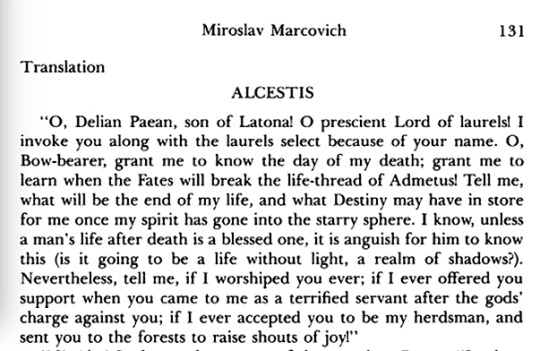
"If I worshipped you ever; if I ever offered you support when you came to me as a terrified servant after the gods' charge against you"
Just...Imagine being Admetus. You worship a god ardently, and that god turns up at your door step as your servant (a terrified servant) and you get to shelter him, accept him. Support him at his lowest. And this god falls in love with you and is serving you in a way that feels like he is worshipping you. ("I am myself godly, and in Admetus, son of Pheres, I found a godly man." - Apollo in Euripides' Alcestis) It is dishonorable for the god but he doesn't care, he is ready to go to any extent to keep you happy.
A commentary on this poem points out how Admetus' addresses Apollo in this way with an intent of binding the god to himself:
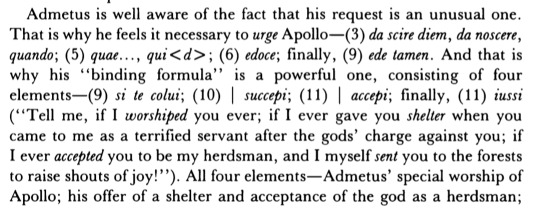
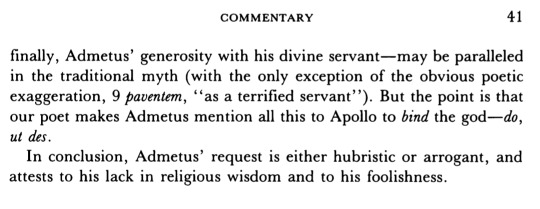
I'm kinda loving how this characterises Admetus as being selfish, or at least insensitive with his request to Apollo. Yes he knows Apollo is no longer his slave, but he knows very well he can still bind Apollo to him and he doesn't hesitate to take advantage of it.
Apollo doesn't have to oblige, because he has already served Admetus exceptionally well during his years of servitude. Even afterwards, he has done enough favours for Admetus - helped him get a wife, saved him from Artemis' wrath. But of course, he still comes to do him yet another favour. It's very fitting that their story is used as an example for servitium amoris (slavery of love) by other poets like Ovid and Tibullus. Despite being free, in his heart he's still a slave to Ademtus' love. Maybe that's why Apollo lets himself get easily bound when Admetus requests for it. He probably knows that this is not entirely fair, but he still answers it because perhaps everything he has done so far is still not enough for him (or perhaps yielding to Admetus' requests has become a fond habit of his)
Back to the poem, this is Apollo's answer to Admetus:
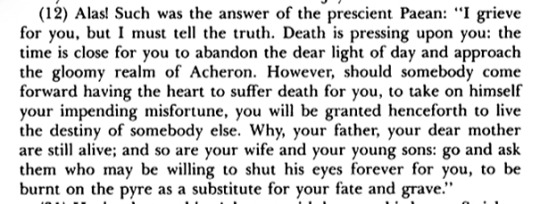
"I grieve for you, but I must tell you the truth. Death is pressing upon you."
Apollo says he is already grieving for Admetus. He must have known that for a while huh. For how long has he been mourning Admetus in secret? :')
He not only answers the questions, but also goes beyond by letting Admetus know how to escape death - something Admetus hadn't asked for (but that probably would have been Admetus' next request). It seems like Apollo is just as desperate to save Admetus as Admetus is to save himself, and maybe he was waiting for the day Admetus would selfishly ask this of him.
Admetus has to find someone to die in his place, so that he can live longer. Given how in Ovid's poem Apollo wishes to renounce his godhood so that he could die with Hyacinthus, I don't think it would be a stretch to imagine that if it was possible, Apollo would have given his years (at least some of his years) to Admetus. Instead, Apollo tells him to ask his parents, wife and children. Where both his parents refuse, Alcestis gladly agrees to die in her husband's place.
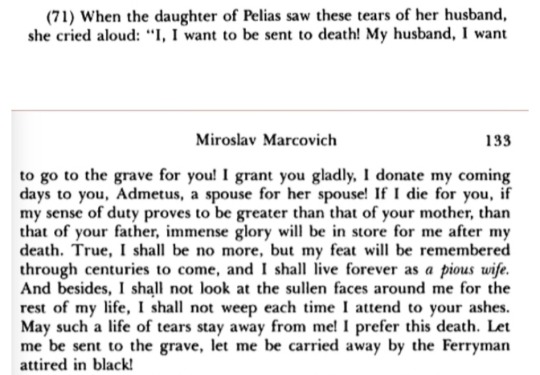
Alcestis agrees to die, first and foremost because it will bring her glory. She will be praised and remembered for being a pious wife. And she will not have to live the life of a widow. That doesn't make her sacrifice any less noble or selfless at all...
But the thing is, while both Apollo and Alcestis go out of their way to save Admetus, Alcestis' act of saving her husband brings her glory and honor, but Apollo's part in saving Admetus only brings him dishonor and scorn from other gods. But that doesn't stop Apollo from still trying to do something for Admetus, to save him in whatever way possible. In Alcestis, Apollo even tries to save Alcestis by negotiating with Thanatos. All for the sake of Admetus.
Like just how much can a god love a mortal?

#Admetus#Alcestis#Apollo#I just fucking love them so much#this is true love#mine#AAA#yes that's the tag for them
109 notes
·
View notes
Text
Hera as a goddess of legitimacy and a force of legitimisation
A lot of stories featuring Hera (not that many, to be honest, but the most famous ones) portray her as relentlessly attacking both gods and demigods sired by Zeus, which has partially inspired people to think of her as a “jealous wife” archetype, but most of these people ignore the main thing that Hera represents: legitimacy.
Hera as the goddess of marriage rules over legitimate unions, and as a result, may choose to pursue those who betray these kinds of unions in some kind of way. An example would be the speed with which she withdrew her sponsorship of the hero Jason why he broke his oath of love and loyalty to his wife Medea in favour of a crown which he was no longer eligible for.
Speaking of Jason, Hera was pretty much his only patron deity during his quest for the Golden Fleece, which was started as a way for him to claim his rightful place on his father’s throne, and this sponsorship started as soon as Jason’s quest started. No prayer was prayed, no offering was offered. Hera just showed up as soon as Jason’s quest for legitimacy started, and helped him as soon as he proved himself to her by carrying her (in the form of an old woman) across a river.
Also, Hera is a goddess who is known for testing the worth of both gods and heroes, especially when they are destined to enter Olympus (her home and domain), and especially when they were born out of an illegitimate union on either her or Zeus’s part. The torments endured by the various children of Zeus at her hand, and even her own (for the purposes of this essay I will take Dionysus, Apollo and Hephaestus)
Apollo
Apollo’s ordeal started even before he was born, as his mother Leto has been denied the right to give birth on any island attached to the land, and was relentlessly chased by a giant snake. Here Hera imposes herself and shows her might as the definitive and legitimate wife of Zeus (Leto was Zeus’s previous wife), and brands any child born from Leto as being under her in terms of status. When Apollo is born and slays the serpent Python, Hera is then forced to recognise that his trial is complete and that he has a claim to the Olympian seat.
Hephaestus and Dionysus
Hephaestus was conceived as a kind of revenge plot against Zeus for conceiving Athena on his own, from the sacred bed which he shares with Hera, but without her input or approval, which prompted the goddess to do the same in order to restore the balance of power within their marriage, and to show Zeus that if he could make a child on his own, then she could too.
However, when the infant Hephaestus was born, it was either Zeus or Hera herself that hurls him down from Olympus, however godly he may be, crippling him in the process and forcing him to EARN the right to re-enter Olympus (kind of like how Hercules in the Disney movie was debuffed so that he would earn his way back into Olympus), which he ultimately achieved by capturing Hera in a golden throne (literally trapping her with one of her most sacred attributes).
Dionysus’s trial begins where Hephaestus’s comes to an end. Having met Hera in his childhood and been rendered mad by her which led to him being rescued by Rhea (whom I assume here to be Rhea-Cybele, whose cult has some of the mad and wild attributes of Dionysus’s), he must have already taken notice of the tests given to him by the goddess, and was waiting for an opportunity to finally take a seat among the Olympians after having established a very respected and feared mystery cult among mortals, so when he heard that Hera was captured by an angry Hephaestus, he jumped on the occasion and coaxed him into following him back to Olympus, where both would finally get recognised as legitimate both in the eyes of the gods and of Hera.
Hera and the sons of Zeus
Hera’s tests mostly seem to affect her husband’s illegitimate Olympian sons, as can be evidenced by the lack of trial for goddesses such as Artemis or Athena. Why is that so?
Personally, I think it’s because sons in Ancient Greece were more valued in society: they could inherit their father’s property, they had claims to the throne and could be seen as heirs to it in case their father somehow resigned. So Hera branding these sons as reformed illegitimate sons could be a way for her to negate their claims to their father’s power and nerf their chances of growing too powerful at the expense of her legitimate children (Orphic Dionysus was literally said to be Zeus’s heir, and would have been had Hera not told the Titans to dismember and eat him), while checking if they are still fit to set foot on Olympus after that serious debuff.
But that’s just my thoughts, I don’t have any source or academic paper that confirms this.
A rule of thumb when analysing Greek myths is that they don’t exist in a vacuum and that as entertaining as they may seem, there is something more to them most of the time, and that is especially the case with a goddess who has a history as long, rich and complex as Hera. It’s really a shame that people only see her as a mean shrew when she has so much more stuff going on, but I guess that with pop culture this complexity has to be diluted and thus misinterpreted by people who don’t have the religious and cultural context of these stories.
Thank you for reading if you made it this far, and may Hera bless you.
61 notes
·
View notes
Text
I always liked that Persona 2 also talked about the Christmas cake label and the theme when exactly a woman should marry, have children or why not never marry at all and live childless. I have always thought that it was annoying when people ask about ‚when will you marry, have children etc.‘
The three example that mention the Christmas cake trope are Junko, Ulala and Mizuno.
Kurosu Junko/Queen Aquarius in Tsumi wishes to be young again since not only is Kashihara dead in Tsumi making her far more nervous about her actress career (she likely fears that she will only get aunty roles and no interesting roles anymore) and obsessed with youth. Since Jun grew up as a latch-key child he on the one hand disliked this but also wanted Junko’s attention (he plays piano to please Junko, he likes omletts since she often made them, he hates cup noodles since he associates it with being neglected).
Junko then ends up redeeming herself by sacrificing herself for Jun at Caracol when she realizes that Joker is Jun.
While Junko is still pretty young as a mother (37, thus she was 20 when Jun was born) there is of course always the subject with her job as an actress if she is still able to get good roles etc.
In Japan when actresses have children and/or marry there are almost always immediately speculations whether the actress retires (it‘s always encouraging when you see that actresses don‘t give up and return). It‘s actually quiet good for Junko that she has ended up in business for so long already.
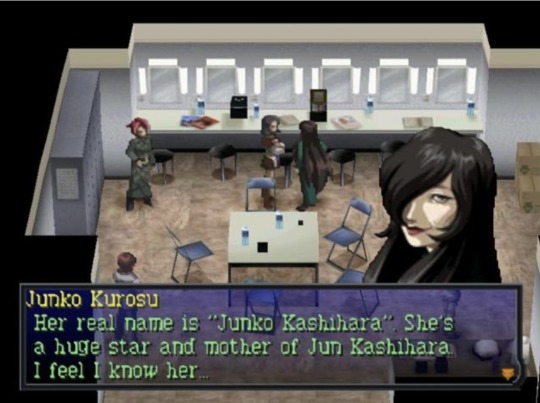
In Batsu Kashihara Akinari is alive and Junko merely uses Kurosu Junko as a stage name this time. The family are all close on This Side.
Junko is more relaxed and it is only implied that had she some sugery this time.
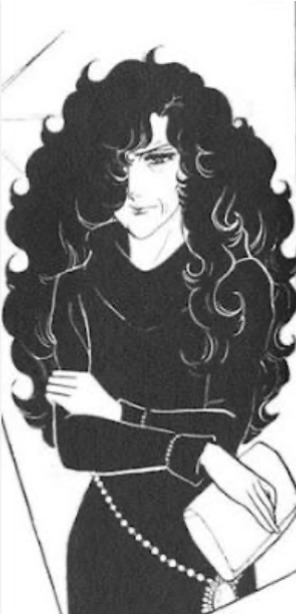
I also think she she greatly resembles Tsukikage Chigusa from Glass Mask in Batsu like mentioned in an interview.
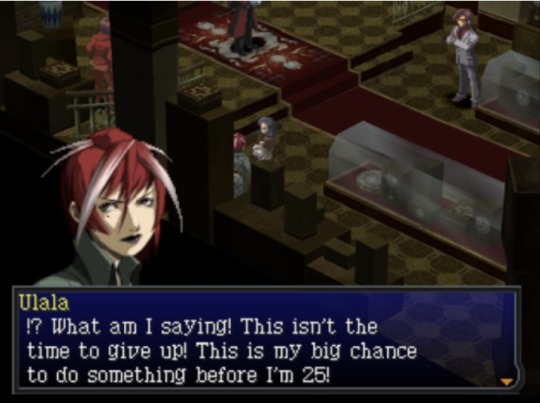
In Ulala‘s case she was born on November 30, 1974. She is 24 close to her 25th birthday since Batsu takes place in autumn 1999.
This is precisely why she is so nervous about her love life, went to Omiai, constantly mentions that she is a Christmas cake soon.
Ulala has an inferiority complex regarding Maya since Maya has a better job, Ulala cooks, cleans, applies make up and chooses outfits for Maya (in mythology Callisto is Artemis‘ servant) and since Maya who is 23 doesn‘t worry about marriage etc. at all.
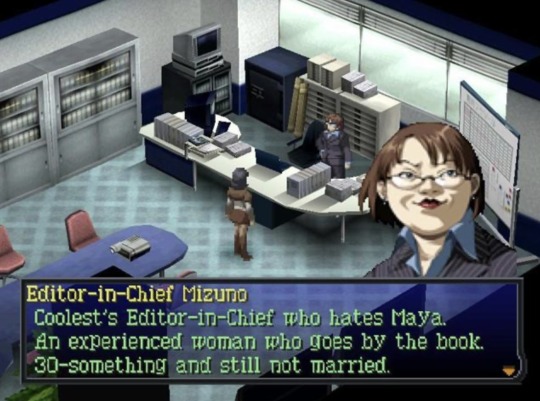
Maya‘s boss Mizuno is introduced as 30-something and still not married.
Even with her who is depicted as grumpy in the beginning she later on becomes milder and talks more about her former dreams etc.
57 notes
·
View notes